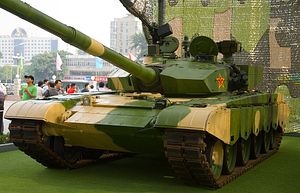Last week, China set up a new committee that will help reform and expand the country’s burgeoning defense industry, China Military Online reported.
According to the State Administration of Science, Technology and Industry for National Defense (SASTIND), the government agency in charge of defense industrial policy, the committee, formally named the Strategic Committee of Science, Technology and Industry Development for National Defense, met on June 3rd for the first time.
China Military Online reports that the committee is composed of experts from various government agencies and public institutions including the Chinese Academy of Sciences, Chinese Academy of Engineering, the National Development and Reform Commission, Ministry of Education, Ministry of Science and Technology, Ministry of Finance and the PLA General Armaments Department.
“The founding of the committee is aimed to gather opinions and advice from leaders and experts in relevant military and civilian departments and units, and get external intellectual support for the strategic development and technological innovation of China’s defense industry,” said Xu Dazhe, the chairperson of the committee and head of SASTIND.
He emphasized that despite progress in research and development, Beijing will have to make a concerted effort should it desire to catch up with the world’s leading exporters of high-tech military hardware. China remains technologically one to two generations behind its principal competitors (e.g., Russia, the United States, Germany etc.) in the global arms trade in producing sophisticated weaponry some studies argue.
A recently published RAND study does point out that China has made substantial progress in modernizing its defense industrial sector. This is mostly due to “sharply increased funding for research and development, sustained high-level leadership attention, and the absorption of advanced foreign technologies, especially from Russia (…).”
However, the report’s overall conclusions cast a dim light on the People’s Republic’s defense industry calling it a “deeply fragmented and flawed system” and singles out five major impediments that would need to be address should China want to become a leading producer of high-tech weaponry.
First, the lack of outside competition due to the defense industry’s monopoly structure undermines innovation. Second, the lack of an innovative spirit is further amplified by the bureaucratic fragmentation of China’s defense industry, which “is a major obstacle to the development of innovative and advanced weapon capabilities because it requires consensus-based decisionmaking that requires extensive negotiations, bargaining, and exchanges.”
Third, the lack of a modern contract management system leads to the PLA continuing “to rely on outdated administrative tools to manage projects with defense contractors in the absence of the establishment of an effective contract management system.”
“A fourth serious weakness is the lack of a transparent pricing system for weapons and other military equipment, representing a lack of trust between the PLA and defense industry,” the RAND study notes.
Last, endemic corruption is cited as an additional factor undermining the industry although the report emphasizes “that that the extent of the problem is not known” due to absence of public reporting on the subject.
An analysis by IHS Jane’s Defence Weekly reinforces the RAND study’s conclusions by noting that any initiative to reform the defense will be ineffective “without significant restructuring of the country’s systems for defense development and production.” China, it seems, will still have a long way to go in order to become a leading country in the production of high-tech weaponry, despite clever marketing ploys by some of its companies (see: “Can This Chinese Tank Beat Russia’s T-14 Armata?”).

































